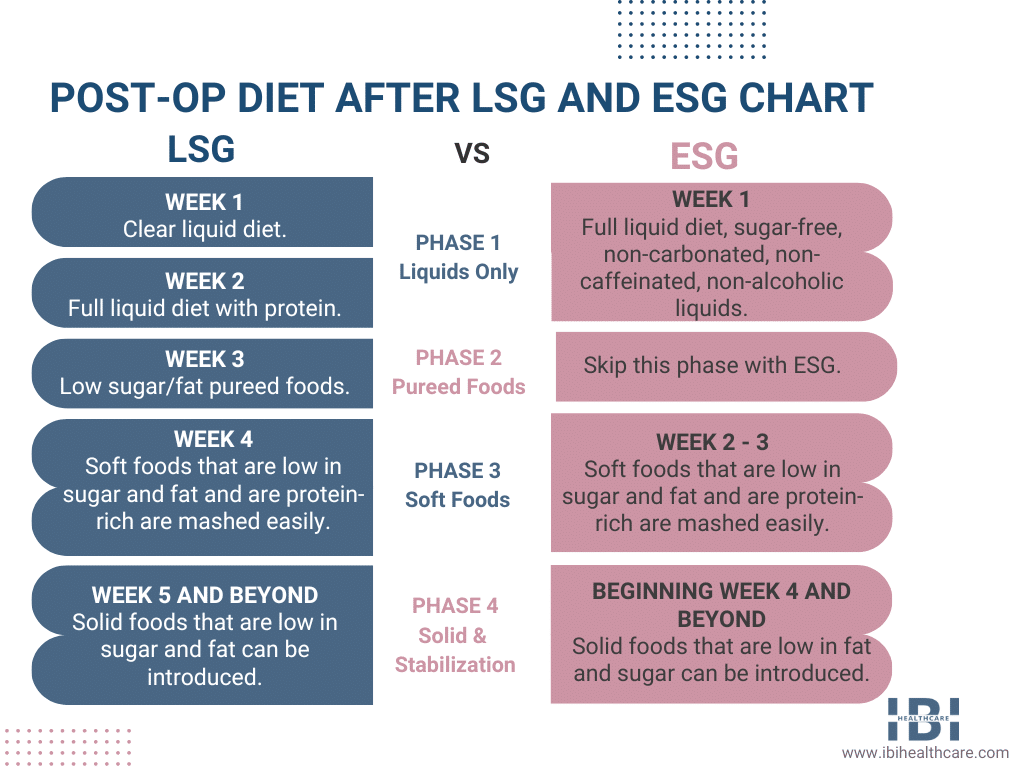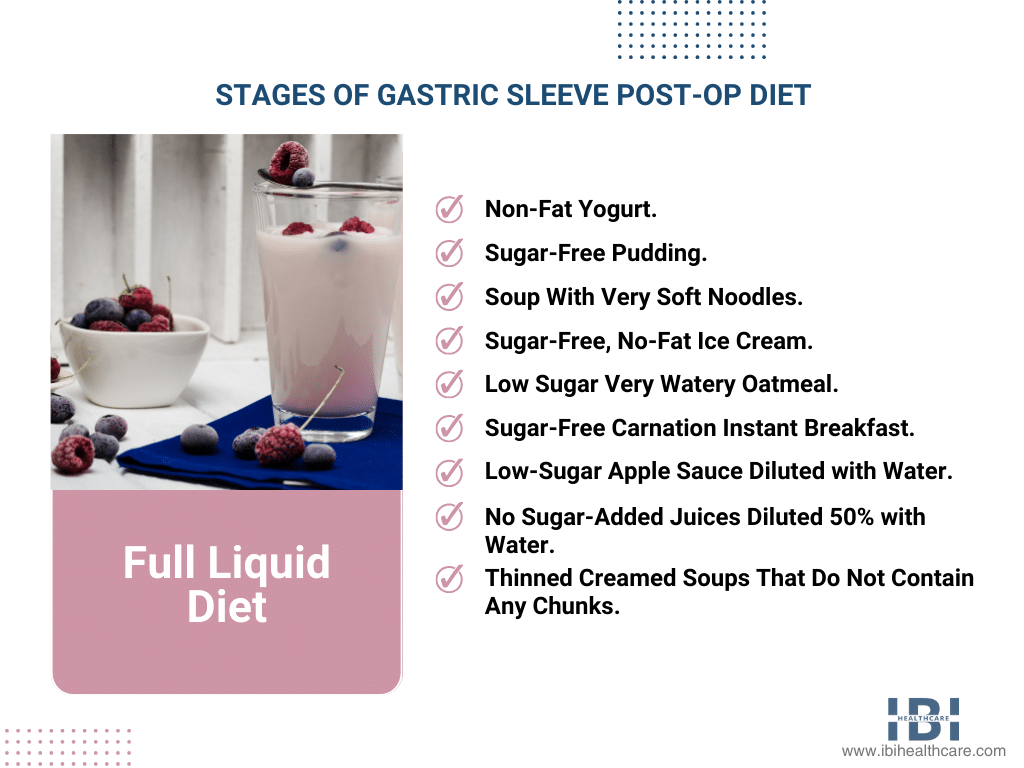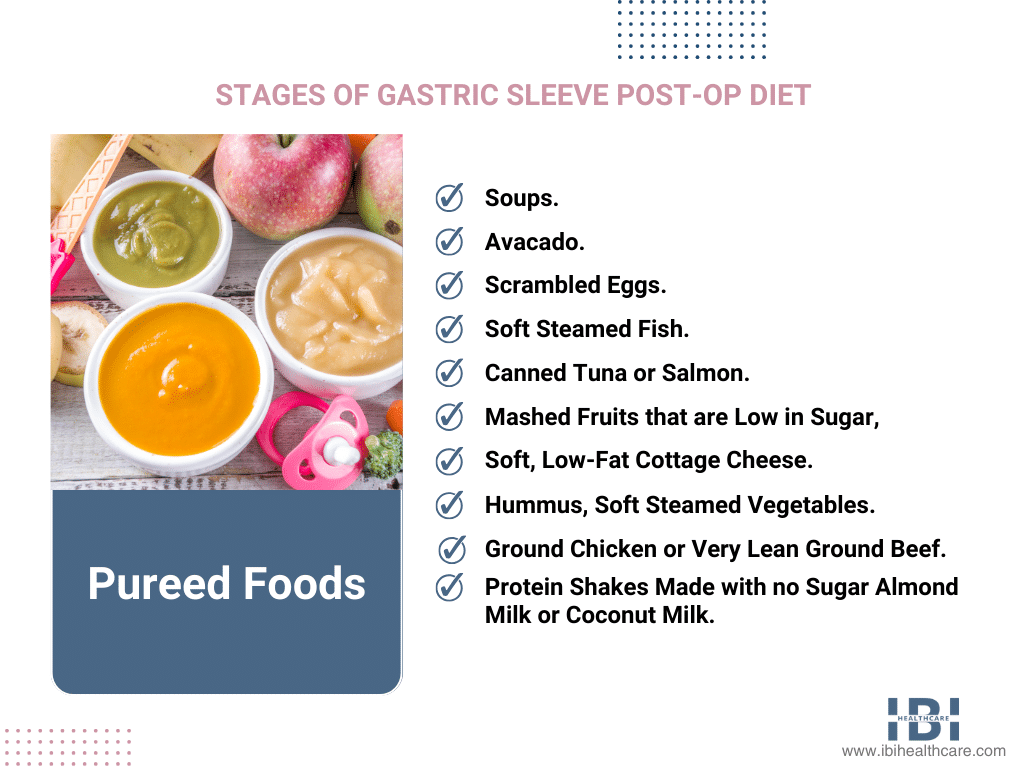Once you have made it past the pre-operative diet and the surgery, you have accomplished a monumental goal and you should be very proud! These are both huge steps on your journey to a healthier life and you know better than anyone what a challenge it was. You may think that the hardest part is over but the truth is, for most patients, it is “the rest of your life” phase that is the hardest, and gastric sleeve post-op diet is part of it.
Bariatric surgery, as a weight-loss aid, works by reducing appetite and stomach size, thereby making overeating difficult. However, it is important to note that it is not a quick fix; rather, it requires ongoing effort and determination to adopt and maintain the necessary lifestyle changes for long-term weight loss success.
What Can I Eat After Gastric Sleeve Procedure?
To effectively reduce surgical risks, you have likely followed a pre-operative diet. Now, it’s time to implement the VSG post-op diet. This transformative diet will start with liquids and gradually introduce solid foods. However, it’s important to note that to maintain a healthy weight or continue losing weight, you must make lasting changes in your eating habits.
To optimize your recovery journey, it’s important to gradually reintroduce foods to your healing stomach. Furthermore, during this process, carefully follow the prescribed diet plan and timeline provided by your surgeon to avoid complications. As you navigate this new way of living and eating, it’s crucial to acknowledge the challenges you may face. Moreover, expect mood swings and allow yourself to feel irritable. Additionally, it’s recommended to rely on your support system during this period.
For those lacking a support system, leveraging IBI Healthcare Institute’s resources can be beneficial. Begin by joining the Weight Loss Facebook Support Group.
What Happens If I Don’t Follow Gastric Sleeve Post-Op Diet?
In short, if you cheat on your post-op VSG diet plan, you may experience unpleasant symptoms including diarrhea, dehydration, constipation, bowel obstruction, or stomach leaking, which could even be a life-threatening medical emergency. Let’s look at some specifics to help you understand better.
Your Stomach Needs a Break
After bariatric surgery, your stomach requires time to heal. During this healing process, the muscle contractions that move food through the digestive tract are temporarily paralyzed. As a result, your stomach can only handle liquids at this point. Trying to consume solids too early can lead to nausea, vomiting, or more severe issues. Following a special diet after vertical sleeve gastrectomy surgery allows your body to receive nutrients while your stomach adjusts to the changes.
Potential Stomach Leak
After undergoing laparoscopic gastric sleeve surgery, it is crucial to ensure the proper healing and strengthening of the staple line on your stomach after a portion has been removed. Additionally, this helps avoid dangerous complications such as stomach fluid leakage into the abdominal cavity, which may necessitate open surgery. It is imperative, therefore, to refrain from consuming solid foods, carbonated drinks, or alcohol, as they pose a risk to your stomach.
Stretching Your Stomach after Gastric Sleeve
Cheating on your post-op gastric sleeve diet can permanently stretch your stomach, thereby nullifying the benefits of the surgery. Furthermore, the major advantage of this bariatric surgery tool is reducing the stomach size, effectively limiting calorie intake per meal, and prolonging the feeling of fullness. After dedicating weeks to a special diet and undergoing major surgery, would you want all that effort to be in vain?
Heartburn after Gastric Sleeve Surgery
Attempting to eat solid foods before your stomach can handle them increases your chances of developing reflux and heartburn. It takes your stomach and digestive system longer to process solid foods (about 6 hours) versus liquids (only 2-4 hours). Some patients have reported excruciating chest pains during heartburn episodes.
Cheating on your post-operative gastric sleeve diet is counterproductive to your goal of living a healthier lifestyle and could negate the effect of your surgery.
What Does The Post-Op Diet after Gastric Sleeve Look Like?
Different gastric sleeve techniques are used to reduce the size of the stomach. Additionally, the duration of each phase in the laparoscopic sleeve gastrectomy diet varies based on the procedure, the patient’s BMI, and any related health conditions.
The table below reflects approximate durations for the surgical laparoscopic gastric sleeve (LSG or VSG) and non-surgical endoscopic sleeve gastroplasty (ESG).
Post-Op Diet after LSG and ESG Chart

What Are the Stages of Gastric Sleeve Post-Op Diet?
Following gastric sleeve surgery, the introduction of foods occurs in distinct phases, encompassing a progression from liquid to solid forms. Moreover, irrespective of the specific bariatric procedure aimed at weight loss management, these phases encompass similar food types. Below are some representative phases and the corresponding foods included within each (please note that the actual prescribed vertical sleeve gastrectomy diet can vary from these examples):
Clear Liquids
The supplements recommended by your surgeon or nutritionist are important for your diet after gastric sleeve surgery. They help prevent deficiencies that can cause serious problems.
Full Liquid Diet
Includes all items listed in the clear liquid diet but also may include thicker liquids and liquids that contain protein, such as:

Pureed Foods
Pureed foods are foods that have been put in a blender and resemble the consistency of baby food. Avoid sugar, bread, rice, pasta, and other starchy foods and veggies that cause gas like broccoli, celery, raw leafy greens, and asparagus. As a general rule, this category will contain things like:

Soft Foods
Soft foods, in contrast to pureed foods, are easily mashed up with a regular fork. The primary aim is to consume low-sugar, low-fat, protein-rich options such as tuna, lean ground beef, beans, lentils, and baked fish. However, it is important to avoid pasta, bread, and starchy foods, as well as those containing sugar or high fructose corn syrup, trans fat, and saturated fat.
Solid Foods
During the final stage of your gastric sleeve diet, when you make the transition to consuming solid foods, it is important to carefully select options that are low in fat and sugar. It is crucial to exclude foods from the list of avoidable choices. Additionally, to prevent issues like constipation, upset stomach, or diarrhea, it is highly recommended to gradually introduce solid foods.
Gastric Sleeve Post-Op Diet FAQs
What Is the Typical Portion Size after Gastric Sleeve Procedure?
After surgery, your food intake will decrease. Initially, start with ½ cup portions and gradually increase to 1 cup portions within a few months. Around 3 months after VSG, you’ll be able to determine your portions accurately.
How to Ensure Staying on the Right Track?
Take your recommended supplements
- The supplements recommended by your surgeon or nutritionist are important for your diet after gastric sleeve surgery. They help prevent deficiencies that can cause serious problems.
Do not drink with meals
- Separating food and beverages during meals can be challenging, as we are typically used to consuming them together. However, this habit leads to stomach stretching and limits the space required for essential nutrients. By consuming food and drinks separately, you can ensure sufficient intake of vitamins and nutrients.
Choose foods that are packed with nutrients
For instance, fish, banana, and apple vs. bread, which is empty and has low nutritional value.
Do not drink your calories
When you are on a limited-calorie diet, you want to make the most of it. Liquids run through our systems faster and do not stick with us. It is wiser to spend your calories on something that will make you feel full longer and will provide more nutritional value.
Chew Your Food Well
- Do not rush through your meals and chew your food well. This will ensure easier digestion as well as give your stomach time to indicate that it is full.
Drink 64 oz of water every day
- It is important to stay well hydrated and stop drinking about 30 minutes before each meal.
Avoid using the microwave to cook or reheat meals
- Microwaving tends to dry out food making it harder to chew and digest. It also removes many valuable nutrients that we need from foods.
Limit Alcohol
- Alcohol after gastric sleeve surgery can put your liver at risk. It converts energy into fat which leads to weight gain.
What Foods Should I NOT Eat After Gastric Sleeve?
Additionally, due to individual differences, the tolerance for different types of food may vary after gastric sleeve surgery. Moreover, over about a year, it becomes possible to determine which foods may cause problems versus those that are well-tolerated. Furthermore, discover the most problematic foods reported by weight loss surgery patients, causing discomfort or physical reactions:
- Starchy foods and carbohydrates like pasta, bread, rice, and oatmeal.
- Fruit and veggies with tough skin like cucumbers and apples, are best peeled.
- Tough meats like steak, chicken or turkey breast, thick salmon.
- Grilled meat: grilling tends to make things chewy and the outer surface tougher.
- Desserts and sugary drinks are high in fat and sugar, and can also cause dumping. They also are high in calories and can cause crashes and extra cravings afterward.
- Foods with high-fat contents such as fried foods, butter, and dairy products.
- Snacks (junk foods) like chips or cookies.
To achieve and maintain a healthy weight, it is crucial to have commitment and determination. Additionally, overcoming cravings for unhealthy foods and breaking old habits is key. Moreover, remember to stick to your post-op diet and persevere through the challenges. The IBI Healthcare Institute team is here to support you!
In times of adversity, make sure to reach out to your support system and celebrate every victory, no matter how small. To discover more about surgical gastric sleeve or non-surgical endosleeve, contact IBI Healthcare Institute without delay. Additionally, set up a consultation today to kickstart your journey. Remember, we are here to assist you in achieving your weight loss goals and improving your overall health. You deserve to become the best and healthiest version of yourself!
Gastric Sleeve Post-Op Diet – FAQ
What is the best diet after gastric sleeve surgery?
Nevertheless, the gastric sleeve post-op diet consists of 4 stages and lasts for about a month. During these stages, you are allowed to consume liquids only, pureed foods, soft foods, and only solids. You should stay on a healthy diet lifetime.
What can I eat 9 days post-op gastric sleeve?
During the second week after the gastric sleeve procedure, you should follow the full liquid diet with protein intake.
What happens if you don’t follow a diet after sleeve?
Moreover, cheating on your post-operative diet plan can result in a range of undesirable symptoms. Additionally, these symptoms may include diarrhea, dehydration, constipation, bowel obstruction, or stomach leaking, which can ultimately lead to a life-threatening medical emergency. Furthermore, it is recommended to follow the prescribed diet plan diligently to avoid such problems.
What is the typical portion size after a gastric sleeve procedure?
However, post-surgery, your food intake will decrease. Initially, opt for ½ cup portions, gradually reaching 1 cup in a few months. Around 3 months post-op (VSG), you’ll better gauge your portions and recognize when to stop.
What foods can I not eat after gastric sleeve?
Gastric sleeve patients often encounter discomfort or physical reactions upon eating certain foods following weight loss surgery. It includes pasta, bread, rice, oatmeal, fruits, and vegetables with tough skin (such as cucumbers and apples), tough meats like steak, chicken, and turkey breast, thick salmon, grilled meat, desserts, and sugary beverages. Additionally, high-fat contents found in fried foods, butter, and dairy products may cause problems. Moreover, snacky junk foods like chips or cookies can also cause discomfort for these individuals.











